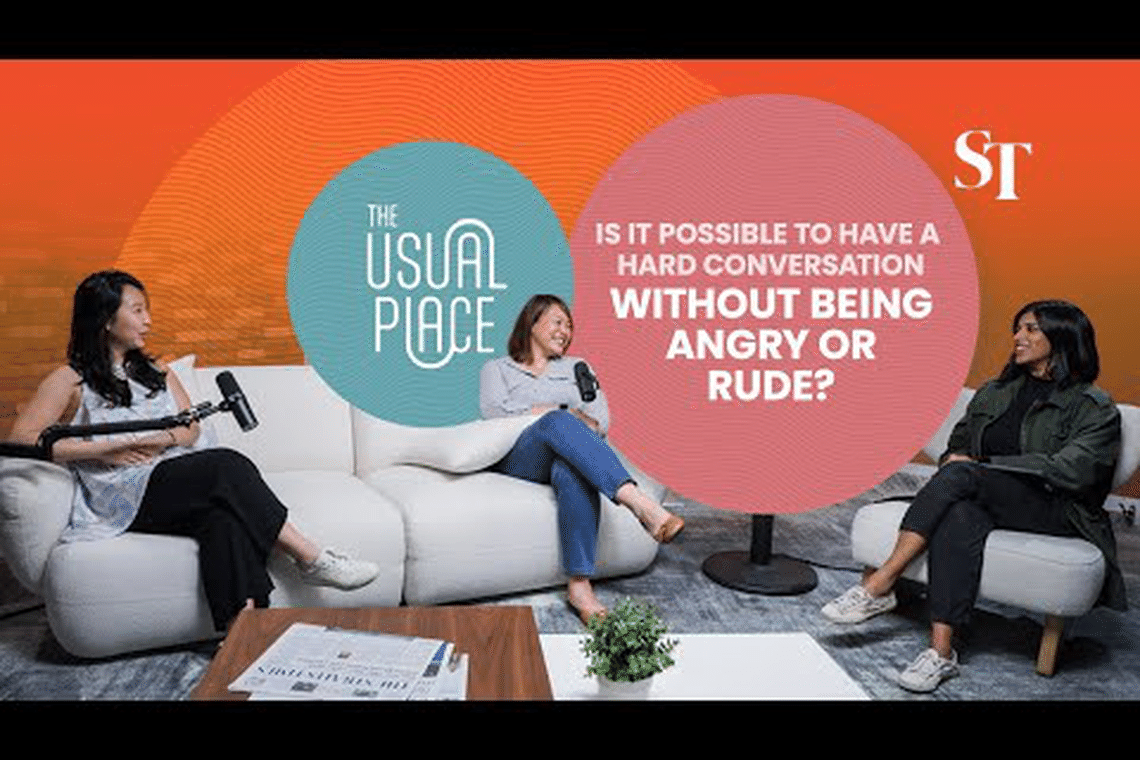Imagine this scenario: You’re on a bus or MRT ride to work when a fellow passenger starts blasting TikTok videos on the phone. What would you do?
A. “Tsk” the person silently and shoot the death glare, while messaging angrily in your friend group chat about annoying commuters.
B. Say out loud that this person should know better and use earphones, then stew silently in anger.
C. Tell this person to turn off the audio to avoid disturbing others who want a peaceful ride
If you selected A or B (or both), welcome to the club. I will confess: I’m not confrontational, but I do get annoyed when people break acceptable social rules and cues that seem obvious to me.
If you chose C, kudos on confronting a stranger, but how would you have done it?
Would your tone have been angry and accusatory, or would you have kept your cool and made a polite request? Would you have sounded irritated without meaning to, or would you have backed off if the person had pulled out the phone to record you?
Whether it’s inconsiderate commuters, vaccine debates, or matters about race, we now have to navigate more difficult conversations. And more people seem on edge – both online and offline.
So how can we have a discussion about issues that matter in society, without blowing up or checking out?
I sat down with Ms Audrey Low, founder of leadership consultancy Designing Trust, and Ms Kuik Shiao-Yin, cultural change strategist and founder of Common Ground Civic Centre and Consultancy, to unpack Singaporeans’ seemingly short fuses, public shaming and mob justice, and explore how we can respond more constructively.

Ms Audrey Low (left), founder of leadership consultancy Designing Trust and an ICF-PCC performance coach; and Ms Kuik Shiao-Yin, cultural change strategist and founder of Common Ground Civic Centre and Consultancy, drop in at The Usual Place podcast to talk about having better conversations.ST PHOTO: GIN TAY
We also talked about why labelling people as “woke” or “social justice warriors” can shut down discussions even before they start.
As Shiao-Yin, a former Nominated Member of Parliament, put it: “When you do that, that tells me that you are not that interested in understanding the other person’s perspectives. You are not even interested in treating the other person as a person. You just want to put an identity on the other person.”
On why we get so outraged when others break what we think are obvious social cues, Audrey pointed to the expectations we place on people, especially around what they should or shouldn’t do.
The co-host and producer of The Curious Co. podcast suggested reframing our language.
“What about changing ‘shouldn’t’ to ‘maybe they could do something differently?’, which is a lot more generative than ‘you should not’ or ‘you should know better’.”
Highlights (click/tap above):
1:28 What does a culture strategist do, and what is an International Coaching Federation Professional Certified Coach (ICF-PCC)?
3:14 Are Singaporeans an angry lot?
5:35 Conflicts arising from conversations in the comment sections
6:50 The psyche of trolls and why people drop rude comments
10:09 What do cavalier, unkind comments say about those who post them?
12:41 Audrey challenges the instinct to say what people should or shouldn’t do
14:37 Why filming confrontations for content may not be the best thing
18:33 Why discussions about racial issues get heated?
21:30 How to have a productive conversation online on dicey issues
24:50 Using labels like “woke” and “social justice warrior” can shut down conversations
28:27 Shiao-Yin believes that getting angry can be a good thing – in certain situations
31:32 What does it mean to make an “appropriate request”?
37:38 How to be open to perspectives that you don’t agree with
39:12 Shiao-Yin’s 10-min “Hard-to-Heart” conversation tool for difficult issues
42:41 Try to find similarities with the person you disagree with, suggests Audrey
Host: Natasha Ann Zachariah (natashaz@sph.com.sg)
Read Natasha’s articles: https://str.sg/iSXm
Follow Natasha on her IG account and DM her your thoughts on this topic: https://str.sg/8Wav
Follow Natasha on LinkedIn: https://str.sg/v6DN
Filmed by Studio 65
Edited by ST Podcast producers: Teo Tong Kai and Eden Soh
The Usual Place producers: Teo Tong Kai and Eden Soh
ST Podcasts’ executive producer: Ernest Luis
Follow The Usual Place Podcast here and get notified for new episode drops:
Channel: https://str.sg/5nfm
Apple Podcasts: https://str.sg/9ijX
Spotify: https://str.sg/cd2P
YouTube: https://str.sg/wEr7u
Feedback to: podcast@sph.com.sg
—
Follow more ST podcast channels:
All-in-one ST Podcasts channel: https://str.sg/wvz7
ST Podcasts website: http://str.sg/stpodcasts
ST Podcasts YouTube: https://str.sg/4Vwsa
—
Get The Straits Times app, which has a dedicated podcast player section:
The App Store: https://str.sg/icyB
Google Play: https://str.sg/icyX
Join ST’s WhatsApp Channel and get the latest news and must-reads.

